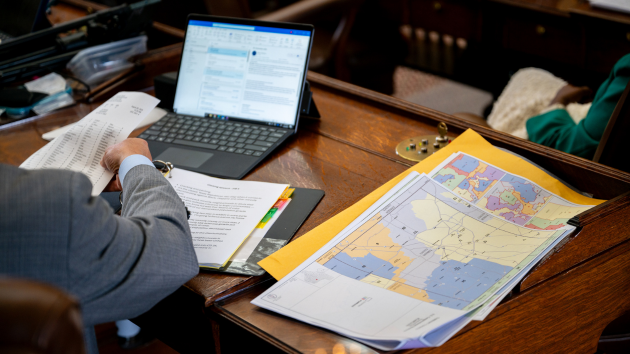Calls for change after 11 people in NYC basement apartments died during catastrophic floods
Written by Lucky Wilson | KJMM.COM on September 3, 2021

(NEW YORK) — The deaths of 13 people, all but two of whom lived in basement apartments, during New York City’s catastrophic flooding this week have renewed attention on the oftentimes illegal dwellings, with city officials looking to bolster evacuation efforts for vulnerable residents in extreme weather.
A record 3.15 inches of rain fell in one hour in the city Wednesday, all but stalling the city’s subway system and prompting dozens of water rescues. At least 13 people have been reported dead in New York City after the remnants of Hurricane Ida swept through the region.
The rapid rainfall inundated residences away from the city’s coastline not prone to flooding, damaging scores of homes and turning at least six basement apartments into death traps.
“The danger came from above,” as opposed to storm surge, New York Gov. Kathy Hochul said during a press briefing Friday, while calling for more effective early warnings ahead of “wicked” weather that she said will undoubtedly become more frequent due to climate change.
New York City Mayor Bill de Blasio said Friday the city will be working on a “more severe kind of warning and more severe set of actions that will be a jolt to people.”
“What we saw in some of these basement apartments on Wednesday was people need to be evacuated who are far away from the coast, because of the sheer intensity and speed, the amount of rain that came in such a brief period of time,” he said, calling this extreme weather “a whole new ballgame.”
“We can say now that extreme weather has become the norm. We need to respond to it differently,” de Blasio told reporters.
The mayor said the city would need to impose travel bans more frequently, instructing people to leave the streets and get out of the subways, and evacuate more New Yorkers ahead of future storms.
To target those who live in basement apartments, changes could include cellphone alerts or door-to-door evacuations, the mayor said. But first, the city would need to create a database of what is conservatively estimated at more than 50,000 basement apartments, impacting at least 100,000 people, de Blasio said.
“We need to have an absolute accounting of all of them and then we can apply these door-to-door techniques if we need to,” he said. “We’ve got to have a clear database to work from and certainly begin with knowing the areas, which we do know, where they are prevalent.”
With many of the city’s basement apartments illegal conversions, oftentimes providing affordable housing to low-income New Yorkers and undocumented immigrants, the city would work with community organizations and other trusted messengers to reach residents, the mayor said.
“We have an illegal basement problem and then we have a problem that so many people end up in illegal basements are fearful to communicate for fear they might be evicted or, worse in their mind, deported,” de Blasio said. “It’s just an extraordinarily challenging set of circumstances.”
Five of the six apartments where 11 people died during the storm were illegally converted cellar and basement apartments, according to the city’s buildings department. Four of them were in Queens and one in Brooklyn. The lone legal basement apartment was in Queens, where a 48-year-old woman was found unconscious and unresponsive at a home near Corona.
Those who died in the illegal conversions included a 43-year-old woman and a 22-year-old man at a basement apartment in Jamaica, Queens; a 50-year-old man, a 48-year-old woman and a 2-year-old boy at a cellar-level apartment in Flushing, Queens; and a 66-year-old man at a cellar unit in Cypress Hills, Brooklyn, based on statements from the city’s building department and New York Police Department.
City officials encouraged basement apartment residents to call 311 or 911 to report issues without fear of being vacated, unless they are facing life-threatening danger.
The risks posed to those living in basement apartments were raised in the city’s “stormwater resiliency plan,” released in May. It included an initiative to develop notifications for basement dwellings “to keep residents out of harm’s way” during extreme rain events, but the completion date wasn’t until 2023.
When asked about that timeline Friday, de Blasio said, “Clearly we have to change that.”
“This is a new deal we’re dealing with now, a new reality,” the mayor said. “We have to take the very muscular approaches that we have, the very forceful approaches like mandatory evacuation, like mandatory travel ban, and use those in ways we never had before, because events are just changing the paradigm constantly.”
On Friday, New York Attorney General Letitia James called on the city to provide emergency housing vouchers to all New Yorkers living in unregulated basement apartments, as extreme weather events have become “the rule, not the exception” due to climate change.
“We know that New York’s housing crisis has gone too far when tenants have to risk their lives just to have a roof over their heads,” James said in a statement. “To prevent these problems in the future, we must also ensure that basement units are safe for human occupancy and regularly inspected. Overcoming the twin threats of climate change and a housing crisis will not be simple, but we must ensure measures are in place to protect our neighbors and prevent a future catastrophe.”
Queens Borough President Donovan Richards also pointed to the city’s affordable housing crisis in the wake of the deadly flooding while pushing for more infrastructure investments in neighborhoods that have been “historically left behind.”
“The reason people are in basement apartments is because of the failure of New York City to really truly build out affordable housing,” he told Pix11 Friday morning. “I was a basement baby myself. … We lived in basements because it provided an affordable opportunity. So this was a failure on many levels, and we need to make sure we’re never back here again.”
ABC News’ Mark Crudele contributed to this report.
Copyright © 2021, ABC Audio. All rights reserved.
 KVSP
KVSP 



